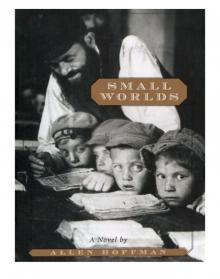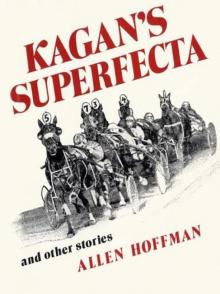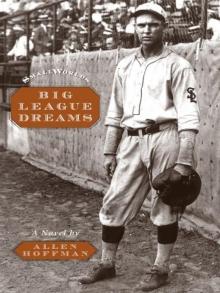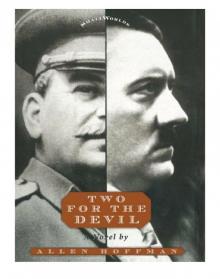- Home
- Allen Hoffman
Kagan's Superfecta: And Other Stories
Kagan's Superfecta: And Other Stories Read online
Kagan’s Superfecta
AND OTHER STORIES
Kagan’s
Superfecta
and other stories
Allen Hoffman
ABBEVILLE PRESS PUBLISHERS
NEW YORK LONDON PARIS
Frontispiece by Fritz Eichenberg
Designed by Andor Braun
Copyright © 1981 by Allen Hoffman. All rights reserved under international copyright conventions. No part of this book may be reproduced or utilized in any form or by any means, electronic or mechanical, including photocopying, recording, or by any information storage and retrieval system without permission in writing from the publisher. Inquiries should be addressed to Abbeville Press, 137 Varick Street, New York, NY 10013. Printed and bound in the United States of America.
First e-book edition: June 2011
E-book: ISBN: 978-0-7892-60003-1
The print edition of this book is cataloged as follows:
Library of Congress Cataloging-in-Publication Data
Hoffman, Allen.
Kagan’s superfecta and other stories.
Contents: Kagan’s superfecta—Hymie the torch—
Building blocks—[etc.)
I.Title.
PS3558.034474K3 813'.54 81-29912
AACR2 ISBN 978-0-89659-234-6
For bulk and premium sales and for text adoption procedures, write to Customer Service Manager, Abbeville Press, 137 Varick Street, New York, NY 10013, or call 1-800-ARTBOOK.
Visit Abbeville Press online at www.abbeville.com
We hope you enjoy this book from Abbeville Press. To write to the author or see our other titles, click here. (This link will open your device’s web browser.)
To my parents
Contents
Kagan’s Superfecta
Beggar Moon
Building Blocks
Hymie the Torch
Balancing Acts
Kagan’s Superfecta
MOST days Kagan was relaxed as he circled endlessly around Ninety-fourth Street searching for a parking space. Yes, he might eat pistachio nuts, or he might fiddle with the radio to pick up the race results, or he might even engage in an absurd, repetitious debate with Ozzie, his angel; still, compared to everyone else, who developed ulcers, suffered heart attacks, or committed homicide while seeking a parking space, Kagan was perfectly relaxed. And why not? It didn’t cost him any money. Not that Kagan was cheap. On the contrary, Kagan was very generous, but, as usual, Kagan was also very broke, and while driving up and down West End Avenue, he couldn’t place a bet. While crossing Broadway, he couldn’t borrow from a shylock. (“No parking on Broadway except Sundays and holidays so why drive up and down Broadway when there’s no percentage?”)
No, Kagan wasn’t like other people. Other people went crazy trying to park cars on the Upper West Side of Manhattan. At first they circled nervously and finally they circled frantically as they came to the terrifying conclusion that they had become one more mechanical appendage of the steering system. Parking on the Upper West Side was positive, irrefutable proof that man was nothing and fate everything. A proposition most people dedicated their lives to denying. No wonder people went mad. In a world reverberating with howling falsehoods, parking on the Upper West Side was a terminal whisper of reality: dandruff cannot be cured, parents disown children, and Sanforized jeans shrink. Most days Kagan did not find such a proposition disturbing. (“Who needs success? I want a few laughs.”) But today was not most days. Today was Erev Yom Kippur — and not just the day before Yom Kippur, but the day before Shabbes, too. A little before sunset both would begin simultaneously, so Kagan wanted to get home, wash, dress, eat, and hurry off to the shtibl.
And Yom Kippur is more than a whisper of reality; it is a hundred-piece symphony that runs twenty-five hours without skipping a beat. On Yom Kippur everyone must atone because his fate is at stake. Everyone is like everyone else, a plain simple human being before a Compassionate Master. On Erev Yom Kippur even Kagan was like everyone else, which might not be such a bad thing except that Kagan was trying to park on Ninety-fourth Street — so Kagan was going crazy. And what does a man of integrity (“I’m not saying I’m righteous — I’m saying I’m just as good as all those people who think they are”) do when he goes crazy? He blames his wife.
“What the hell does she know about Yom Kippur anyway?” he muttered, his eyes darting from one side of the street to the other. “A lot she knows! Fran from Connecticut. Yom Kippur in boring-land. A comic strip. Everyone’s alike and everyone gets into his car and everyone arrives at the temple on time and everyone parks his clean car on the parking lot with the yellow stripes and everyone smiles. What the hell does that have to do with life?” In anger, Kagan gripped the steering wheel so tightly that his knuckles turned white. Parking lots with yellow stripes!
Things weren’t that way when Kagan was a kid. That’s for sure. Not on your life, thought Kagan. Kagan grew up with life. Surrounded by life. Almost drowned in life!
The quick twinge of memory calmed him. Kagan decided to savor it. He surrendered, slouching down behind the wheel, loosening his grip, and welcoming the return of distant streets and ancient corners, fire escapes and candy stores.
WHEN Kagan was young, really young, Rosh Hashanah was a treat and Yom Kippur was a bore, a dread. Nothing to do, nothing to eat, and all the grownups droning on and on, endlessly pounding their breasts in short, choppy, tedious strokes. And all that sighing! With all that carbon dioxide (and Kagan didn’t even believe in science — why should he? it never made sense), it’s a miracle no one died. No one even fainted, not even Mrs. Rubinstein, and she used to faint at the drop of a hat. The Duke of Windsor abdicated — Mrs. Rubinstein fainted. The seder night of Passover, Hirshorn the plumber’s wife went into labor. The ambulance attendants rushed up the steps and Mrs. Rubinstein, a spineless heap, plunged into their arms. They opened their stretcher and rushed her to the hospital, siren roaring and lights flashing as ferocious screams began in the plumber’s apartment. And Rubinstein? Rubinstein stood on the sidewalk, a corner of his white linen seder-night napkin tucked under his belt, a high yarmulke on his head, uttering plaintively after the ambulance, “Rivka, what’s for dessert?” All the while the flashing lights were growing smaller, the siren’s howl more distant, and upstairs the cries more insistent and more urgent.
That was a neighborhood! Oh, how Kagan loved that neighborhood, but he didn’t kid himself. He had run away as fast as the others, but he had loved it, too, as much as he had hated it. What’s for dessert? Forty-five years, starting in Poland, she makes one thing. Wherefore is this night different from all other nights? What’s for dessert? Compote!
“WHAT did Fran know about that?” Kagan cried. Fran said that he romanticized it all. It wasn’t that way, she claimed. “Even so,” he asked slyly, “do you think I’ll talk that way about you someday?” She called him a shit. (Fran was a modern woman; she shit with the door open. “It is honest.”) What did she know? She was from Connecticut. Kagan, a shit? A bastard, maybe, but not a shit. (Kagan was not a modern man.) Leave it to a modern woman to get everything wrong — even when she’s right.
And all the time she complains about the same stories. When they got married, did he promise her a new routine every night? Year in and year out he’s not supposed to complain about the same wife, but the material is supposed to change from show to show. That’s not the way it works. (Kagan had been in show business! Oh, it would have been nice to have had a stage career; he had the talent all right.) Everybody knows the first thing you do is change the audience. You take the show on the road. That’s what you do. But that takes money. Everything takes money. And
if there was one thing Kagan didn’t have, it was money. He and Fran agreed on that. That’s about the only thing he and Fran agreed on.
Kagan snorted. What did Fran know about that? She had no idea just how much money he didn’t have. And Kagan wasn’t about to tell her either. Some things are sacred: a man’s shylocks, for instance. If she ever found out about them, that would be it. Kagan often wondered why he didn’t tell her.
He hadn’t signed his life over to her. He had only married her — in Connecticut, yet. The marriage might not even be good in Manhattan. A thought which Kagan found appealing: married in Hartford, engaged in Bridgeport, reconciled in Westchester, separated in the Bronx, footloose and fancy-free in Manhattan. All at the same time!
And Kagan wasn’t a legalist. He hated legalists. This separated him from most of his Orthodox brethren. Kagan was a man of the spirit. (That didn’t exclude the flesh.) He prided himself, no, he exalted himself on being a man of the spirit, but he was also a man of the people. The rich make all the laws so why shouldn’t the poor have a few? It’s true that as a high-school teacher he earned more than most of the poor but he spent more and was just as broke as any one of them. Forget the credit union, forget the loan companies, he had the shylocks to prove it! Yes, Kagan was a man of the people; in this he remained constant — more or less. Kagan smiled. He wasn’t a liar. And, anyway, the thought of all those idiotic forms where it always asks “Marital Status” amused him. “See accompanying map,” he would reply. Theirs was an affair of the latitude and longitude, all right. She didn’t give him enough latitude and he had gone on for too longitude. Fifty-four forty or fight! How could he fight? He couldn’t even find a parking space. And Yom Kippur was coming!
Kagan stared out at the unrelenting wall of parked cars. You’d think they’d give a guy a break Erev Yom Kippur. Where is Ozzie anyway? Erev Yom Kippur a guy needs his angel, so naturally, no angel. What a world. And people think I’m crazy? Kagan shook his head and decided to drive slowly around one more time.
Latitude and longitude — there must be a joke there someplace, but it’s not there now. The rhythm isn’t right, Kagan reflected. Still, it’s better than the stuff you hear on TV. Kagan once had an act — well, really, a routine. It wasn’t so bad and one year, his best year, he played a lot of places with it: the mountains, Atlantic City, even a Communist camp. (Kagan, man of the people!) As Kagan himself admitted, he took that act everywhere except to the top. Anything for a joke. Okay, here goes. Good evening, ladies and gentlemen, let me give you a little piece of advice. Never marry a foreigner. Let me tell you about my wife. She’s a foreigner. My wife’s from Connecticut, maybe you’ve heard of it. I thought she’d massage my back, wash my feet, and serve a lot of low-cholesterol dishes. But, folks, never marry a foreigner whose eyes don’t slant. And don’t let the contact lenses fool you. Sometimes they slip around and create some pretty weird effects.
All foreigners are not alike. In Connecticut their eyes don’t slant.... Hartford!... Ah.... It sounded romantic. For that matter, everything north of Fourteenth Street sounded romantic: Central Park, Rockefeller Center — even Fifteenth Street sounded romantic. But Hartford sounded like the twin city to Xanadu. It wasn’t just a dream. I was there. It’s another country. The kids ride bikes — that belong to them.
Believe me, just because you don’t have concrete under your feet doesn’t mean life is a picnic. For a picnic you need a hamper. God forbid you should use a brown paper bag like a mensch! No, you need a hamper so you’ll look like a faggot trying out for the role of Little Red Riding Hood.
I know all about foreign places because of my wife. Basically, my marriage was a geographical relationship. You see, if you get married in a foreign place like Hartford, it isn’t recognized south of Fourteenth Street. All the places in between are neither here nor there. Legally, in Hartford I’m a married man; in Bridgeport I’m engaged; in the Bronx I’m legally separated; in Manhattan, north of Fourteenth Street, I’m going steady; and south of Fourteenth Street I’m footloose and fancy free.
You know, on those forms where it asks “Marital Status,” I have to put down “see accompanying map.” It’s not so surprising when you think of it, since ours is strictly an affair of the latitude and longitude. When she puts it down on the lattitude and I get it up on the longitude, everything is Rand-McNally. The rest of the time it’s fifty-four forty or fight.
Kagan laughed. Not bad. A routine like that and still no parking space. Where is justice? He looked at his watch, a garish iridescent green contraption that he had received as a consolation prize on a quiz show. A dummy prize, really. The other contestant, some boring broad from Yonkers, won eight hundred dollars and a boat. And what did he win? One shiny pickle-green watch and fifty dollars’ worth of trayf Colonel Sanders Kentucky Fried Chicken — and I keep kosher yet! Some luck! That’s like Mao Tse-tung winning fifty shares of AT&T. Not bad, a routine there somewhere. A routine but no money; that’s the story of my life. Could I have used the money! Could I have used my life! Kagan sighed. And not just the money, the boat, too.
She certainly didn’t know what to do with the boat. Hell, I had her, but “your host” managed to melt his smile long enough to speak. “It is finger-lickin’ good, Mr. Kagan, but our policy is no trading of prizes on the program.”
“Who’s trading prizes? We’re sharing a little.”
“I’m sorry, Mr. Kagan.” I’m sorry Mr. Kagan, my ass. They can’t trade prizes but they can give me lousy questions. How many astronauts have walked on the moon? What a dumb question! Who asked them to go? They had no business up there in the first place.
Kagan stoically glanced at his green watch. Winning is better than losing but losing is action and action is better than no action. Kagan could wear the ugly, pickle-green bastard, all right, but still — why didn’t he get the easy questions? Who knows, Kagan mourned philosophically, maybe there’s a reason I get the hard ones.
Kagan looked about more carefully. Cars aligned with curbs for blocks as if God had created them that way. Still no spot. I’ll go; it won’t hurt.
Kagan ceased his slow prowl for a parking spot and was heading downtown at a steady speed when a voice broke in on his thoughts.
“Mikveh! Mikveh! Mikveh! Kagan, leave it to you. You’re too much.”
It was Ozzie, Kagan’s angel.
“Yeah, Ozzie, what’s wrong with the mikveh? A Jew goes to the mikveh for a ritual bath before the Day of Atonement.”
“Kagan, you think it will help you on next year’s quiz show? You’ll have pickle-green watches up and down your arms until you look like a Timex frog.”
“Look Ozzie, what do you care why I’m going? I’m going to the mikveh. It’s the right thing to do, isn’t it?”
“Suddenly you are governed by the right thing to do?!”
“Listen, this is Erev Yom Kippur, the eve of the holiest day of the year. A man and his angel should get along. What do you say?”
“Kagan, if you can’t park on Ninety-fourth Street, how are you going to park on Seventy-eighth?”
“I don’t have to,” Kagan answered smugly.
“No? What are you going to do? Drive your Sixty-four Falcon right into the mikveh? It won’t work, Kagan. For this junk heap you need more than a mere dip for the Day of Atonement, you need resurrection of the dead. You need the automotive Messiah. And, Kagan, even a man of faith like you wouldn’t buy a car like this from the Messiah.”
Kagan smiled. “You forget. I haven’t paid for this one yet. Ozzie, how long does it take for a quick dip? I’ll leave it double-parked.”
“All right, Kagan, but get your little pagan head together. Is the power of this divine dip to be applied towards a boat and eight hundred dollars or towards avoiding a ticket for double-parking?”
“You lack faith, Ozzie. You’re too analytic. You should have been a scientist instead of a divine.”
Right in front of the mikveh, Kagan pulled his old Ford alongside another car and hop
ped out.
2
KAGAN blanched, closing his eyes, as he met the hot, moist air of the mikveh. He felt the puddles underfoot and opened his eyes. That’s all I have to do — break my back in a mikveh. Fran would never believe it. I could muster witnesses, too. Half the Upper West Side must be here. Maybe Ozzie knew what he was doing when he stayed outside. That’s some crazy angel!
“Hey, fella!” a voice called through the mists. “You pay over heah.”
Kagan stepped toward the voice and found the mikveh attendant standing next to a table with an open corrugated cardboard box on it. The little refugee, sweat rolling down the tautly drawn skin of his forehead and temples, pointed to the box.
“I didn’t want to pay until I was sure you were going to fix the air conditioning,” Kagan said.
“Say, dat’s a good one.”
“You got a student discount?”
“Here, we charge ‘em more.”
Kagan relaxed. The heat eased. He had a naturally curious bent of mind.
“You charge ‘em more? Everybody else charges ‘em less.”
“Students take too long in the mikveh. They don’t have nothing better to do.”
“Yeah,” Kagan said, satisfied. “That sounds right. How much is the businessman’s special? A real commercial quickie?”
“Five dollars.”
“Five dollars! What’s in the mikveh, champagne?”
“It’s tax deductible. You want a receipt?”
“Receipt,” Kagan said in earnest amazement, “I want a loan.”
As Kagan dropped his five-dollar bill into the box, he felt a thrill of astonishment. In that farshtunkener soggy cardboard box on that moist table enveloped by clouds of steam and attended by a sweat-covered, bony-skulled little man lay the coolest, crispest five-dollar bills in town. Who would have guessed? Kagan was proud to be a Jew. No wonder the mikveh man didn’t let the heat bother him; he was standing next to the cool stuff.

 Small Worlds
Small Worlds Kagan's Superfecta: And Other Stories
Kagan's Superfecta: And Other Stories Big League Dreams (Small Worlds)
Big League Dreams (Small Worlds) Two for the Devil
Two for the Devil